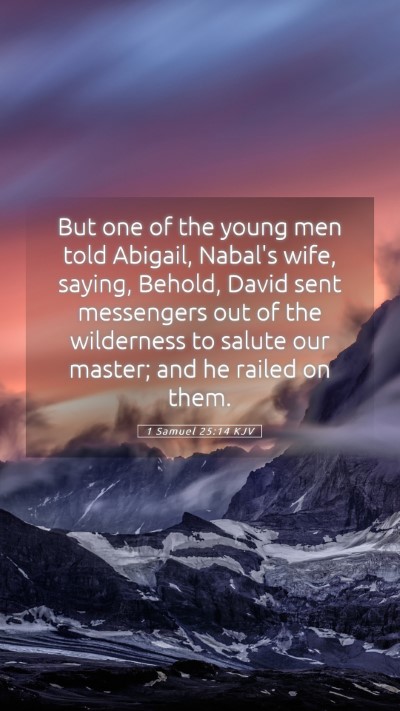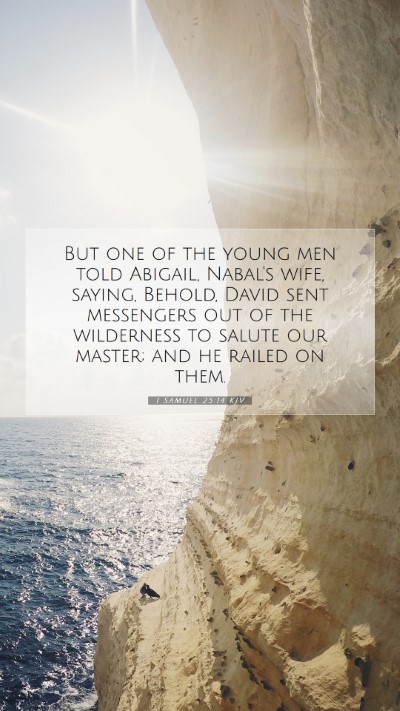Bible Verse Commentary on 1 Samuel 25:14
Understanding 1 Samuel 25:14
This verse is situated in a narrative that reveals significant themes of communication, conflict resolution, and the nature of human relationships within the biblical context. It highlights the dynamics between David and Nabal, emphasizing how interpersonal disputes can escalate without wisdom and humility.
Context and Overview
1 Samuel 25:14 states: "But one of the young men told Abigail, Nabal's wife, saying, 'Look, David sent messengers from the wilderness to greet our master, and he reviled them.'" This account encapsulates the story of David seeking provisions from Nabal, who scornfully rejects him, which sets the stage for Abigail's wise intercession.
Key Insights from Commentaries
- Matthew Henry's Commentary:
Henry notes that the actions of Nabal illustrate a lack of hospitality and respect for David's leadership, which ultimately invites conflict. The young man's report to Abigail underscores the importance of wise counsel in times of crisis, positioning her as a key character who acts with foresight.
- Albert Barnes' Notes:
Barnes emphasizes that this verse serves a critical function in illustrating the moral responsibilities of individuals in positions of power. Nabal's harsh treatment of David's emissaries is a significant factor that leads to potential calamity, bolstering the theme of justice.
- Adam Clarke's Commentary:
Clarke draws attention to the social etiquette surrounding hospitality in ancient Israel, suggesting that Nabal's behavior was not only personally offensive but also a breach of cultural norms. This sets the stage for Abigail's intervention, highlighting her wisdom and courage.
Thematic Elements
The verse presents several pivotal themes:
- Conflict and Resolution: The relationship between David and Nabal serves as a microcosm of broader conflicts within human interaction, where misunderstandings can lead to significant consequences.
- Wisdom and Gender Roles: Abigail's role as a peacemaker highlights the influence and power women can wield in public and personal spheres, challenging traditional gender norms.
- Accountability: Nabal's actions bring him into conflict with David, illustrating the biblical principle that we are accountable for our actions, particularly towards others.
Application and Relevance
The narrative encourages readers to reflect on their own responses to conflict and the importance of wise, thoughtful communication. It speaks to those engaged in bible study groups or online bible study, urging participants to delve into the wisdom exhibited by Abigail in her response to danger and strife.
Cross References
- Proverbs 15:1: "A soft answer turns away wrath, but a harsh word stirs up anger." - This verse complements the theme of wise communication.
- 1 Samuel 25:18-19: Highlights Abigail's quick actions to provide for David and his men.
- Matthew 5:9: "Blessed are the peacemakers, for they will be called children of God." - Reflects the call to be a peacemaker, much like Abigail.
Conclusion
In sum, 1 Samuel 25:14 invites deep bible study insights into the nature of conflict, accountability, and the role of wisdom in resolving disputes. The account serves as a timeless reminder of the significance of understanding scripture and applying its teachings to daily life.


